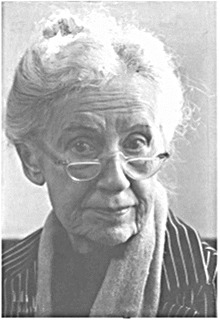Maggie Kuhn facts for kids
Quick facts for kids
Maggie Kuhn
|
|
|---|---|
 |
|
| Born |
Margaret Eliza Kuhn
August 3, 1905 Buffalo, New York, U.S.
|
| Died | April 22, 1995 (aged 89) |
| Occupation | Elder rights activist |
| Known for | Gray Panthers |
Margaret Eliza "Maggie" Kuhn (born August 3, 1905 – died April 22, 1995) was an American activist. She is famous for starting the Gray Panthers movement. She began this group after she had to retire from her job at age 65. Back then, many people had to retire at a certain age.
The Gray Panthers fought for better nursing home conditions. They also worked against ageism, which is unfair treatment based on a person's age. Maggie Kuhn believed that older people and women had a lot of energy and talent that was not being used. She spent her life working for human rights, fairness, and world peace.
Contents
Maggie Kuhn's Early Life and Work
Maggie Kuhn was born in Buffalo, New York. Her family later moved to Cleveland, Ohio. Her mother wanted to raise her children in the North because the South was segregated at that time. Maggie studied English at Flora Stone Mather College. This college is part of Case Western Reserve University.
From 1930 to 1947, she worked for the YWCA. This organization helps young women. Maggie taught women about joining unions and other important social issues. During World War II, she became a program director for the YWCA-USO. She spoke out against the war, which was a brave choice. She also supported desegregation and opposed McCarthyism.
Later, Maggie worked for the Presbyterian Church. She helped the church focus more on social justice. This meant working to make society fairer for everyone. She believed that students should learn about real-world problems. She made sure her students went out to find poverty in their communities.
Starting the Gray Panthers Movement
In 1970, Maggie Kuhn was forced to retire from her job. She loved her work with the Presbyterian Church, but she had reached the mandatory retirement age of 65. She decided to team up with other retirees. Together, they formed a group that became the Gray Panthers.
At first, the group had a longer name. But in 1974, Maggie was on a TV show with Johnny Carson. He called her group the "Gray Panthers," and the name stuck. The Gray Panthers believed all types of unfairness were connected. They fought for the rights of older people, but also for peace and against poverty. Their first big cause was opposing the Vietnam War.
Maggie Kuhn also helped older people with money issues. After an elderly woman was robbed, Maggie got help from Ralph Nader. They worked with a bank to create special savings accounts for people over 65. These accounts were free and made it easier for older people to get loans.
Age and Youth in Action
The Gray Panthers' motto was "Age and Youth In Action." Many young people, including high school and college students, joined the group. Maggie Kuhn thought that teens should be taken more seriously. She believed they should be given more responsibility in society. She felt that society was wasting the valuable energy of young people.
The Gray Panthers also challenged the idea that older people should separate from society. This idea was called "disengagement theory." Maggie Kuhn said that American society treated older people as problems. She argued that older people were experiencing problems created by society. She also questioned how older people were shown in movies and on TV.
Maggie Kuhn spoke out about Social Security. This is a program that helps older and disabled people. She believed that politicians were trying to make young and old people fight over money. She said this was to hide bigger money problems, like too much spending on the military.
Maggie Kuhn also criticized housing for older people. She called them "glorified playpens." She felt that these places kept seniors safe but also separated them from everyone else. Maggie lived in her own home in Philadelphia, Pennsylvania. She shared her home with younger adults. They paid less rent in exchange for helping with chores and offering companionship. Maggie called this group her "family of choice." She even started a group called the Shared Housing Resource Center.
Maggie Kuhn wrote her life story, called No Stone Unturned, in 1991. She passed away in Philadelphia in 1995 at age 89. In 1995, she was honored in the National Women's Hall of Fame.
Archival collections
The Presbyterian Historical Society in Philadelphia, Pennsylvania, has many of Maggie Kuhn's letters, documents, and photographs. These materials show her personal life and her important work.
 | Claudette Colvin |
 | Myrlie Evers-Williams |
 | Alberta Odell Jones |

